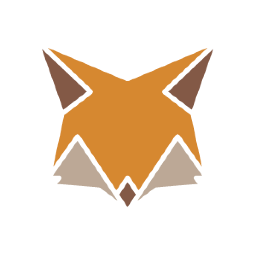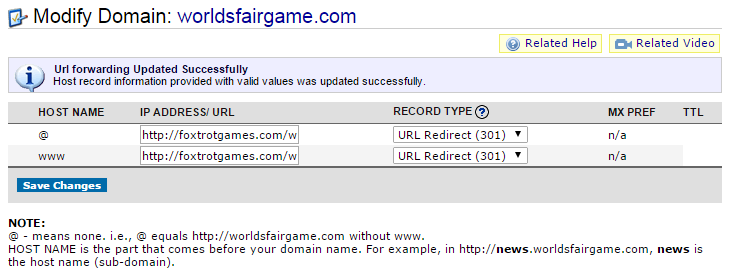Here’s a look at the research we did for the individual exhibit cards in World’s…
Separate Domains For Each Game
Countdown: 75 days. We have a domain name for our company, but we also have domain names for each of our games that we can redirect to different locations.
 The main website for my company is FoxtrotGames.com, but I also register a domain name for each of our games. (I first saw this implemented by Days of Wonder, looking at advertisement cards in my copy of Ticket to Ride.) I do not have a separate website for each game, but I use a domain name redirect to send visitors where I want them to go.
The main website for my company is FoxtrotGames.com, but I also register a domain name for each of our games. (I first saw this implemented by Days of Wonder, looking at advertisement cards in my copy of Ticket to Ride.) I do not have a separate website for each game, but I use a domain name redirect to send visitors where I want them to go.
Benefits
Here are the three main benefits:
- Change Redirect Location: Reviewers and interviewers often ask where they should send people for more information. I can give them the domain for the game, which they often include in the review. I can then change where that link takes them over time:
-
When I am doing initial marketing for the game, I can set the domain up to redirect to a landing page on my site (where people can sign up for a launch notification) or to a Kickstarter preview page. (I’ve tried both, and I’m not yet sure which is best.)
Example: WorldsFairGame.com
-
During a Kickstarter campaign, I change the domain to redirect straight to the Kickstarter campaign page; that’s the destination we want to promote at that time. When I change it, all the old links that used to go to the landing page now go to the live Kickstarter page.
-
After a Kickstarter campaign, I set the domain to redirect to the section for the game on my website. When I change it, the old links that went to the Kickstarter campaign page will now go to my website.
Example: RelicExpedition.com
-
-
Easy To Type: I print the domain name on postcards, the rulebook, and other items. It’s easy for people to read it off the printed item and type it into their web browser.
- Easy To Say: When I talk to people in person or in an interview for a podcast, it’s easy for me to say (and for the hearer to remember) a short, snappy domain name. “Lanterns Game dot com” works much better in this context than “Go to Kickstarter and search for Lanterns; I think it’s the third or fourth result right now.”
How To Set This Up
There are a few different ways to do this, but the easiest is to configure it at your domain registrar. To register a domain name, you pay $12/year or so to a company like NameCheap or GoDaddy. In their interface, you can usually set the domain name up as a redirect. I use NameCheap, and I can configure this setting under “URL Forwarding.” Here’s what the screen looks like:

In this example, I tell NameCheap that I want WorldsFairGame.com and www.WorldsFairGame.com to redirect to a landing page on my main Foxtrot Games website.
301 or 302?
There are two different codes that the server can use when it redirects: either 301 (location has changed permanently) or 302 (location has changed temporarily). I have tried both, and I haven’t seen any practical difference. The only real difference seems related to how search engines rank the domain name. The best recommendation I have been able to find is this:
- If you always plan for the domain name to redirect (even if you plan to change the destination periodically), then 301 seems to be the recommendation. That’s what I use now. It seems that search engines will pass the credit they would normally give to the domain name along to the destination.
- A 302 redirect seems to work best if you only want to redirect people somewhere else temporarily but then eventually plan to have a real website at the domain.
Other Notes
In addition to the domain name, I also create a matching Twitter account. (For Lanterns, I have LanternsGame.com and @LanternsGame.) Space is really limited on Twitter, and you can easily create a link to another user’s profile by mentioning the user. I tweet a lot about games as I’m developing them, and it’s an easy way to give people the opportunity to look for more information without pushing a link on them.
I only have one Facebook page, for Foxtrot Games, not one Facebook page for each game. I don’t post as much about development on Facebook (that’s just a personal preference), and Facebook posts look nicer if you include a full web address (a photo, a link title, and a description).
—
Do you have separate domains, Twitter accounts, or Facebook pages for your games? Do you handle this another way? To you have any additional insight into whether to use 301 or 302 redirects? Let me know in the comments!
This Post Has 2 Comments
Comments are closed.


I have yet to find much on this. I work with Good War Games ( goodwargames.com ), we’re an indie studio from Miami. All of our Social Media accounts are Goodwargames which keeps things simple. Everyone could go in there and check out what we’ve been working on, but when working on multiple games it’s difficult to promote one while still wanting to show off the other. It would be simple to have separate accounts for each game, but as an indie studio it would be more work for us to switch back and forth and keep each updated well. So for now its just the studio name for social media and the studio’s name for the site. It’s been working well for us now because we send everyone to one page but I wonder if it will be confusing in the future since the games and the studio are individual brands fighting for attention, targeting different niches. I’d love to get some advice on this as well as learn about how other studios handle this.
Kat – from Good War Games
Yeah, it’s definitely an interesting balance to create strong brands for the company and the games. I think most people find out about games by the game name, and you want to do what you can to also get them to associate the company name with them. That’s why I use FoxtrotGames as the main brand for things.
* I do register domain names for the games, but I always redirect them to a page on my company site.
* I do create Twitter accounts for the games, but only so that I can mention them as links in my tweets. If someone reads one of my tweets and says “Oh, what’s @LanternsGame?” that can be a link to the profile page for that account. I rarely tweet from the game accounts; it’s really there more as a reference. I do have an app on my phone that checks for notifications on the game accounts just so I know if someone mentions it, but I try to drive people to the FoxtrotGames brands.